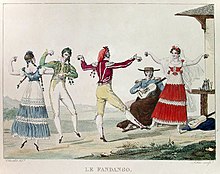
Back فندانغو Arabic Fandangu AST Fandanqo (rəqs) Azerbaijani Fandango Catalan Fandango Danish Fandango German Fandango Esperanto Fandango (baile) Spanish Fandango Basque Fandango French
This article includes a list of general references, but it lacks sufficient corresponding inline citations. (May 2012) |


Fandango is a lively partner dance originating in Portugal and Spain, usually in triple meter, traditionally accompanied by guitars, castanets, tambourine or hand-clapping. Fandango can both be sung and danced. Sung fandango is usually bipartite: it has an instrumental introduction followed by "variaciones". Sung fandango usually follows the structure of "cante" that consist of four or five octosyllabic verses (coplas) or musical phrases (tercios). Occasionally, the first copla is repeated.
The meter of fandango is similar to that of the bolero and seguidilla. It was originally notated in 6
8 time, of slow tempo, mostly in the minor, with a trio in the major; sometimes, however, the whole was in a major key. Later it took the 3-4 tempo, and the characteristic Spanish rhythm.[2]
- ^ Blatter, Alfred (2007). Revisiting music theory: a guide to the practice, p. 28. ISBN 0-415-97440-2.
- ^ Grove, Sir George (1908). Grove's Dictionary of Music and Musicians. New York: McMIllan. p. 5.